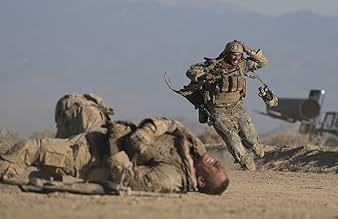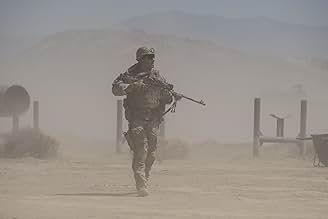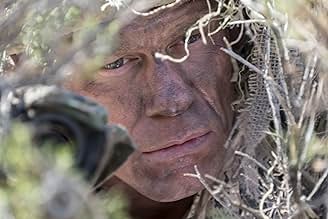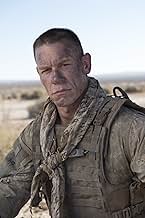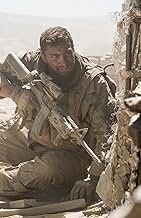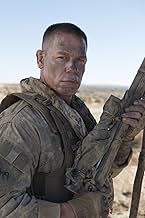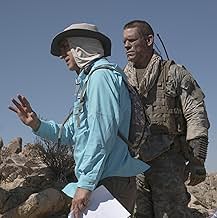The Wall
Deux soldats américains sont piégés par un sniper redoutable, séparés par un mur instable.Deux soldats américains sont piégés par un sniper redoutable, séparés par un mur instable.Deux soldats américains sont piégés par un sniper redoutable, séparés par un mur instable.
- Réalisation
- Scénario
- Casting principal
- Réalisation
- Scénario
- Casting principal
- Récompenses
- 1 nomination au total
Résumé
Reviewers say 'The Wall' offers a tense psychological thriller with a unique premise and strong performances, especially from Aaron Taylor-Johnson. The film's suspense is highly praised, yet criticized for unrealistic military tactics. The ending is divisive, seen as either shocking or disappointing. Some argue an anti-American bias exists, while others find a balanced view of conflict. Overall, 'The Wall' is a mixed bag with compelling tension and performances, but flawed by inconsistencies and a contentious conclusion.
Avis à la une
Greetings again from the darkness. When a director's filmography includes "big" action movies like Edge of Tomorrow, Mr. & Mrs. Smith, and The Bourne Identity (the original), the last thing we expect is a stripped-down war movie whose camera focuses on a single character almost the entire run time. Director Doug Liman certainly understands how to use the camera in creating tension and stress, yet while he and writer Dwain Worrell seem so intent on proving the confusion and futility of war, they seem to forget that a thriller needs either a hero to cheer or a villain to jeer.
It's late 2007, and the war is winding down as rebuilding efforts are underway. Hulking Staff Sergeant Matthews (John Cena) and his fellow soldier Isaac (Aaron Taylor-Johnson) have been perched and camouflaged on the side a hill for more than 20 hours as they carry out reconnaissance on the site of an under-construction oil pipeline. All they have seen is the remains of a massacre – 8 bodies with no signs of life. Peering through his malfunctioning scope that once belonged to a now-dead friend, Isaac (known as "Ize" – get it?) and his training thinks something doesn't seem right. When Matthews deems the site safe, he heads down to check it out. Of course, all heck breaks out and soon enough, an injured Isaac takes shelter alone behind a teetering stone wall. It turns out a sniper, more patient than the American soldiers, had been biding time for the moment.
The first eight bodies are construction contractors and a security detail none of which mattered to the sniper. The hook here is that the sniper hacks into Isaac's radio and seemingly wants to chat it up, rather than finish him off. We never see the sniper, and neither do Matthews or Isaac but we do hear him plenty. Laith Nakli voices Juba – known to American soldiers as the Angel of Death, responsible for dozens of US casualties. The film spirals into a psychological game of chess – or, more fittingly, the torture of Isaac. This isn't the war we've come to expect in movies. Isaac's situation seems hopeless, and banter with the man responsible never strikes him as a worthwhile pursuit.
The biggest issue here is that Juba seems the most interesting character, and not only are we never provided a way to connect with/hate him, we don't even get enough backstory to bond with Isaac. Plenty of obstacles are thrown at Isaac: blowing sand, lack of drinking water, skittles for sustenance, blazing sun/heat, radio issues, and a brutally painful knee wound courtesy of Juba. The success of the movie depends on two things: Aaron Taylor-Johnson selling us on Isaac's predicament, and the radio dialogue between he and Juba. The former is fine, but the latter falls short.
Better sniper movies include American Sniper and Enemy at the Gates, while more effective (mostly) one-character thrillers include Locke, Buried, and 127 Hours. The film makes excellent use of sound, but the little jabs at American ideals grows old quickly (such as asking who is the real terrorist). A different approach to a familiar topic deserves a chance, but while Juba only misses on purpose, the efforts of Mr. Liman and Mr. Worrell miss the mark by not engaging the viewer with the character(s).
It's late 2007, and the war is winding down as rebuilding efforts are underway. Hulking Staff Sergeant Matthews (John Cena) and his fellow soldier Isaac (Aaron Taylor-Johnson) have been perched and camouflaged on the side a hill for more than 20 hours as they carry out reconnaissance on the site of an under-construction oil pipeline. All they have seen is the remains of a massacre – 8 bodies with no signs of life. Peering through his malfunctioning scope that once belonged to a now-dead friend, Isaac (known as "Ize" – get it?) and his training thinks something doesn't seem right. When Matthews deems the site safe, he heads down to check it out. Of course, all heck breaks out and soon enough, an injured Isaac takes shelter alone behind a teetering stone wall. It turns out a sniper, more patient than the American soldiers, had been biding time for the moment.
The first eight bodies are construction contractors and a security detail none of which mattered to the sniper. The hook here is that the sniper hacks into Isaac's radio and seemingly wants to chat it up, rather than finish him off. We never see the sniper, and neither do Matthews or Isaac but we do hear him plenty. Laith Nakli voices Juba – known to American soldiers as the Angel of Death, responsible for dozens of US casualties. The film spirals into a psychological game of chess – or, more fittingly, the torture of Isaac. This isn't the war we've come to expect in movies. Isaac's situation seems hopeless, and banter with the man responsible never strikes him as a worthwhile pursuit.
The biggest issue here is that Juba seems the most interesting character, and not only are we never provided a way to connect with/hate him, we don't even get enough backstory to bond with Isaac. Plenty of obstacles are thrown at Isaac: blowing sand, lack of drinking water, skittles for sustenance, blazing sun/heat, radio issues, and a brutally painful knee wound courtesy of Juba. The success of the movie depends on two things: Aaron Taylor-Johnson selling us on Isaac's predicament, and the radio dialogue between he and Juba. The former is fine, but the latter falls short.
Better sniper movies include American Sniper and Enemy at the Gates, while more effective (mostly) one-character thrillers include Locke, Buried, and 127 Hours. The film makes excellent use of sound, but the little jabs at American ideals grows old quickly (such as asking who is the real terrorist). A different approach to a familiar topic deserves a chance, but while Juba only misses on purpose, the efforts of Mr. Liman and Mr. Worrell miss the mark by not engaging the viewer with the character(s).
If you expect a war movie full of action then you should just skip The Wall. If you expect a war movie with a lot of different characters then you should just skip The Wall. But if you're in to watch a war movie with psychological warfare, where a sniper plays with the life of a couple American soldiers then The Wall is worth giving it a shot. Because that's what you get. Aaron Taylor-Johnson is the main character and you will almost watch him for the entire movie. His mate played by John Cena has a much smaller role. The other big role is for Laith Nakli playing the sniper but him you won't even see, he's just a voice in an earphone. So not much characters, not much action, but still enough suspense to make it an interesting war movie to watch.
The movie is a snap of what happened, happens and would happen at war with lives, hopes, and disguise at stake. There is no wonder that the American soldier is depicted as one with a heart, with hope for life, and with a brain. Yet, if you look at the movie from an alien point of view you would understand that the soldier is a foreign land whom he has no idea why he is there, who he is fighting for, or even whether this war he's fighting and involved will change his world or the worlds of other. In other words, if your house is made of glass, don't throw at people stones. The producer tries to depict the lost souls who unwillingly fought for their countries or rather for their superiors and the so-called enemies who are on a mission to get back at them being pushed by what happened to them or to their countries. What separates truth, untruth, life and death is a mere wall that can collapse at any time.
What starts out as an insular, straight-forward war thriller soon becomes a somewhat sillier, 'Phonebooth (2002)'-esque affair that's really only carried by our two leads' willingness to get down and dirty in the desert sand as they scramble for cover from the chatty sniper pinning them down. The pace in 'The Wall (2017)' is usually slow but there are several genuinely suspenseful and otherwise more energetic moments peppered throughout. The general design of the piece is also relatively realistic - including some stellar sound design that has the crack of each distant shot echo out only after the splat of its impact. This means that there are tangible stakes in almost every scene, even when there isn't any real entertainment. 6/10
60U
A strange mixture of positive reviews from the critics and low ratings from the audience. It's true that this movie does have its plusses and minuses. It's not an impressive war movie and could have benefited more from a POV perspective. There is some character revelation as it goes on which gradually makes a slow pace movie more palatable. I had to take lots of little breaks to get through it myself but I feel the twist ending makes it worthwhile.
Le saviez-vous
- AnecdotesNicholas Irving, former US RANGER Sniper and author of The Reaper is a technical advisor on this project. Irving was nicknamed "the reaper" during his tours of duty in Afghanistan
- GaffesEarly in the movie, when Issac is removing blocks from the wall to make an opening to look through with his scope, the blocks fall and damage his hand, specifically his right index, or "trigger finger". That finger is shown bloody and misshapen, possibly broken, for a vast majority of the remainder of the movie. At the end, he is able to take a shot at the enemy sniper using that same finger and it is shown to be uninjured. Precise trigger control is critically important to making accurate shots, particularly for a sniper. Making a long range shot like that with an injured or broken finger is highly unlikely.
- Citations
Juba: You Americans. You think you know it all. You think it's simple. That I am your enemy. But we are not so different, you and I.
Isaac: Yeah, 'cept I ain't a fuckin' terrorist.
Juba: And you think I am? You are the one who has come to another man's country. Camouflaged yourself in his land, in his soil. From where I'm sitting, *you* look very much like the terrorist.
- ConnexionsFeatured in Chris Stuckmann Movie Reviews: The Wall (2017)
- Bandes originalesI'll Make Love to You
Performed by Boyz II Men
Written by Kenneth 'Babyface' Edmonds (as Kenneth Edmonds)
Meilleurs choix
Connectez-vous pour évaluer et suivre la liste de favoris afin de recevoir des recommandations personnalisées
- How long is The Wall?Alimenté par Alexa
Détails
- Date de sortie
- Pays d’origine
- Sites officiels
- Langue
- Aussi connu sous le nom de
- En la mira del francotirador
- Lieux de tournage
- Sociétés de production
- Voir plus de crédits d'entreprise sur IMDbPro
Box-office
- Montant brut aux États-Unis et au Canada
- 1 803 064 $US
- Week-end de sortie aux États-Unis et au Canada
- 897 955 $US
- 14 mai 2017
- Montant brut mondial
- 4 477 141 $US
- Durée
- 1h 28min(88 min)
- Couleur
- Mixage
- Rapport de forme
- 2.35 : 1
Contribuer à cette page
Suggérer une modification ou ajouter du contenu manquant







